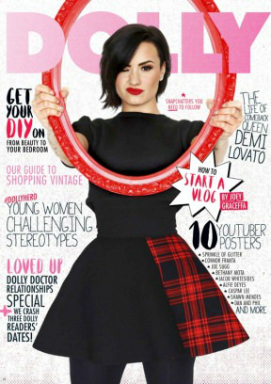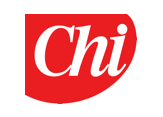Vanity Fair is an American monthly magazine of popular culture, fashion, and current affairs published by Condé Nast in the United States.

The Australian Women's Weekly, sometimes known as simply The Weekly, is an Australian monthly women's magazine published by Are Media in Sydney and founded in 1933. For many years it was the number one magazine in Australia before being outsold by the Australian edition of Better Homes and Gardens in 2014. As of February 2019, The Weekly has overtaken Better Homes and Gardens again, coming out on top as Australia's most read magazine. The magazine invested in the 2020 film I Am Woman about Helen Reddy, singer and feminist icon.

Ralph was a monthly Australian men's magazine that was published by ACP Magazines, a division of PBL Media between August 1997 and July 2010. The format and style of Ralph was similar to other men's magazines, such as Maxim and Loaded.

Toplessness refers to the state in which a woman's breasts, including her areolas and nipples, are exposed, especially in a public place or in a visual medium. The male equivalent is known as barechestedness.

TV Week is a weekly Australian magazine that provides television program listings information and highlights, as well as television-related news.

Zoo was a British lad's mag published weekly by Bauer Media Group in the United Kingdom. It was launched on 29 January 2004, and for a time was the UK's only men's weekly after the similar and rival magazine Nuts closed in April 2014.
Tziporah Atarah Malkah is an Australian former model and actress.

Miranda May Kerr is an Australian model and businesswoman. Kerr rose to prominence in 2007, as one of the Victoria's Secret Angels. Kerr was the first Australian Victoria's Secret model and also represented the Australian department store chain David Jones. Kerr has launched her own brand of organic skincare products, KORA Organics, and has written a self-help book.

Dolly was an Australian bimonthly teen magazine started in 1970 by Fairfax Ltd. in Australia and New Zealand, and purchased by ACP in 1988. The magazine became an online-only publication, and the print edition ceased, in December 2016. In June 2020, the magazine was purchased from the Bauer Media Group by Mercury Capital.

Lara Worthington is an Australian model and media personality. She is known for appearing in the 2006 Tourism Australia advertising campaign So where the bloody hell are you?. Her own reality television series, Being Lara Bingle, premiered on Network Ten in June 2012, ending after one season.

Amy Elizabeth Duggan is an Australian retired association football player and media personality.

Cleo is an Australian monthly women's magazine. The magazine was founded in 1972 in Australia; the Australia and New Zealand editions were discontinued in February 2016. Aimed at an older audience than the teenage-focused Australian magazine Dolly, Cleo was published by Bauer Media Group in Sydney and was known for its Cleo Bachelor of the Year award. In June 2020, Cleo was acquired by the Sydney investment firm Mercury Capital.

Chi is an Italian weekly gossip magazine geared towards a female viewership published in Milan, Italy.
Pacific Magazines was a magazine publisher operating in Australia owned by Seven West Media. In March 2020, it was acquired by Bauer Media Australia in April 2020. In June 2020, Mercury Capital acquired Pacific Magazines as part of its purchase of Bauer's former Australian and New Zealand assets.

Rebel Melanie Elizabeth Wilson is an Australian actress, comedian, writer, singer, and producer. After graduating from the Australian Theatre for Young People in 2003, Wilson began appearing as Toula in the SBS comedy series Pizza (2003–2007) and later appeared in the sketch comedy show The Wedge (2006–2007). She wrote, produced and starred in the musical comedy series Bogan Pride (2008). Shortly after moving to the United States, Wilson appeared in the comedy films Bridesmaids and A Few Best Men, both in 2011.

The eighth cycle of America's Next Top Model aired from February 28, 2007 to May 16, 2007, and was the second season of the series to be aired on The CW network.

Heinrich Bauer Publishing, trading as Bauer Media Group, is a German multimedia conglomerate headquartered in Hamburg. It operates worldwide and owns more than 600 magazines, over 400 digital products and 50 radio and TV stations, as well as print shops, postal, distribution and marketing services. Bauer has a workforce of approximately 11,000 in 17 countries.

Woman's Day is an Australian women's magazine published by Are Media. It is one of Australia's widely read weekly magazines as of June 2023.
Karen Jo Pini is an Australian actress, model, TV personality and beauty pageant titleholder. She represented her country at the 1976 Miss World pageant held in London, United Kingdom and finished first runner up. She was also the nude centerfold in the first Australian edition of Playboy magazine in February 1979. Pini also co-hosted the weekly televised New South Wales lotto draw for twelve years.

Are Media is an Australian media company that was formed after the 2020 purchase of the assets of Bauer Media Australia, which had in turn acquired the assets of Pacific Magazines, AP Magazines and Australian Consolidated Press during the 2010s. It is owned by the Sydney investment firm Mercury Capital.















